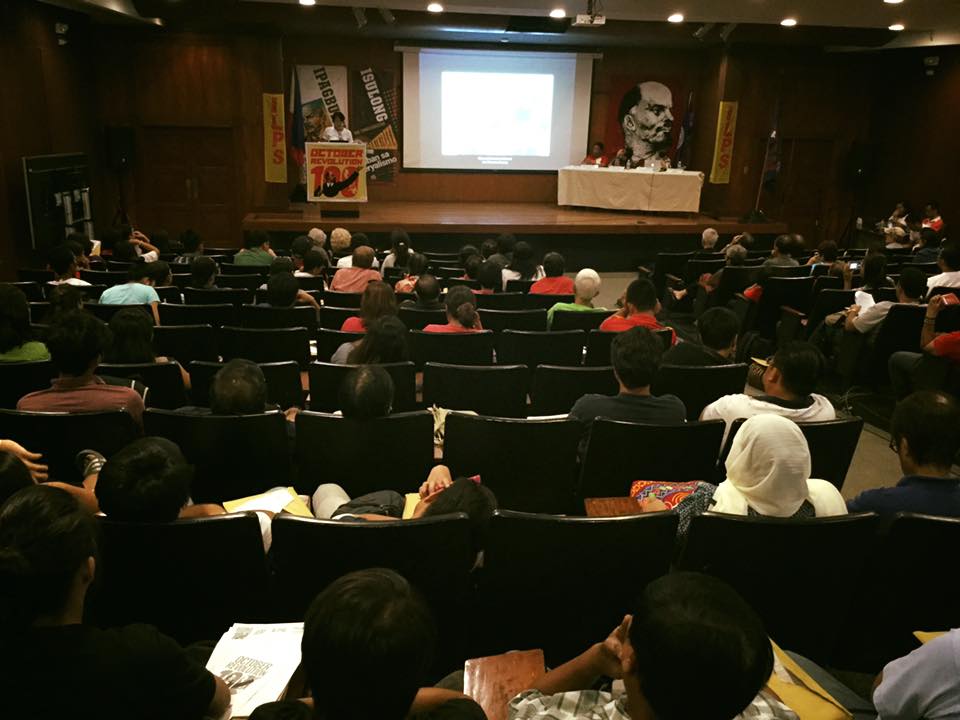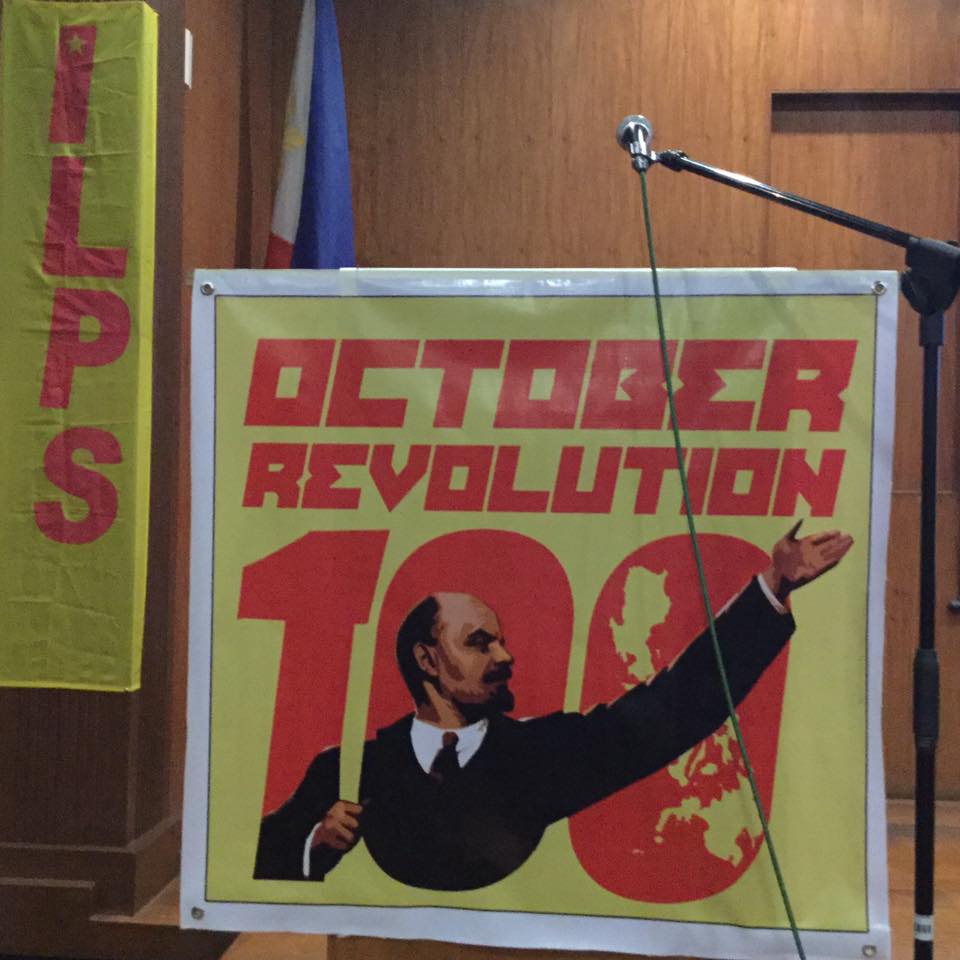Impact of October Revolution in British India and Manipur
- Part 1 -
Dr. Malem Ningthouja *

'Centenary of the Great October Revolution' at University of the Philippines, Manila
Impact of October Revolution in British India and Manipur
Presented on the Occasion of the Centenary of the Great October Revolution
May 5-6, 2017
University of the Philippines, College of Law,
Manila, Philippines
(Paper presented on behalf of Malem by Windel Farag-ey Bolinget of Cordillera Peoples Alliance)
Dear comrades,
The Russian October Revolution of 1917 was an epoch-making event in the history of mankind. I am sure most of the comrades who are speaking on this occasion to commemorate the centennial program touch upon the significance of the event. I shall not go further into the details.
But let me quote the international significance of the event as elaborately stated by J.V. Stalin, in 1927, on the occasion of the Tenth Anniversary of the October Revolution in 1927. Stalin, in his work entitled The International Character of the October Revolution termed the revolution "a revolution of an international character towards a new world order."
According to him, it was a "source of the profound sympathy which the oppressed classes in all countries entertain… as a pledge of their own emancipation… (it) has shaken imperialism not only in the centres of its domination, not only in the metropolises. It has also struck at the rear of imperialism, its periphery, having undermined the rule of imperialism in the colonial and dependent countries."
In the words of the Indian historian Prof Amar Farooqui, "The experience of the October Revolution in Russia and the excitement over the revolutionary initiatives of the Bolsheviks, attracted an increasing number of activists to socialist ideas and communism. … (it) was of momentous significance for the oppressed peoples of the world. It inspired new revolutionary movements; radicalized people's struggles; and had a profound impact on national liberation movements. Further, it made Marxism–Leninism a potent ideological force internationally."
My focus, today, is to provide with a brief overview of the direct impact of the October Revolution on the then British India in the first two decades and the indirect impact, several decades later, on the then princely state of Manipur. Before going into this, it is worth pointing out that British India was directly ruled upon by the British. On the contrary, there were several princely states in the Indian subcontinent that were indirectly ruled upon through the respective monarchs and feudal lords.
Due to uneven process of development, means of transport, communication, exchange of ideas of political organization; there was no uniform standard inflow of information and spread of political ideas across the subcontinent. The princely states and tribal communities in what today constitute the Northeast India predominantly lived in the confines of their respective world. As a result, when seen from a holistic overview, the direct or indirect impact of the October Revolution across different regions in the subcontinent differed in time, space, magnitude and implications.
Let me now present the overview in two sub-sections; (a) Direct Impact of October Revolution on British India, and (b) Indirect Impact on Manipur in different time.

'Centenary of the Great October Revolution' at University of the Philippines, Manila
Direct Impact
of October Revolution
in British India
In the immediate decade after 1917, the Russian Revolution was a major source of inspiration to many Indian nationalists, in British India who were spearheading struggles to liberate from the British colonial rule. The commitment of the Bolsheviks to national self-determination, the grant of independence to Finland, Declaration of the Rights of People of Russia (15 November 1917), Lenin's thesis on National and the Colonial Question 1920, the call for an end to imperialist war and for peace, and the principle of national liberation and social emancipations; all these seemed to have produced an unprecedented model that was coveted by many who had wanted to establish a social system that would be freed from various forms of external and internal subjugation, oppression and exploitation.
What was most attractive to the nationalists across different political strands seemed to be the Soviet attack on imperialism. Many Indian nationalists hailed the Soviet hostility to imperialism in general and British rule in particular. It is being said that a vast chunk of nationalists had become frustrated with both the British rule and the pre-existing forms of pessimistic resistance and mediocratic appeals under the leadership of the Indian 'national' bourgeoisie. The latter are being charged for alleged co-option with the colonial rulers.
The disgruntled sections found more appealing to the model of October revolution, soviet structure revolutionary government or communist thought. Objectively, however, those who believed in communism were few in number and they were targeted by the State. They had to work along with others on the path to people's democratic revolution. What then became apparent was a broader course of anti-colonial resistance comprising various strands of ideological positions and political stands, which more or less drew inspirations from the October Revolution. These were reflected in literary expressions, propaganda works and organization.
In literary expressions, the Russian Revolution was hailed high by many prominent poets such as Rabindranath Tagore and Iqbal. Bal Gangadhar Tilak defended Lenin in his journal Kesari (29 January 1918) and denounced British propaganda. Subramania Bharati composed an ode entitled New Russia as a mark of eulogizing the revolution. Bombay Chronicle and Modern Review followed the same trend.
Several Hindi and English booklets and biographical accounts were published in praise of Lenin and the Russian Revolution and communist literatures and circulated. The first communist weekly in India, entitled, Socialists, began printed from Bombay in 1922. Political statements and activities of the Russian communists were carefully followed in literary expressions.
In organization and activity, the Russian Revolution made a militant and popular impact on the pre-existing anti-colonial struggle. It acted as a morale booster to the revolutionaries amongst the Indian emigres and within British India.
First, among the emigres there were individuals who were already influenced by socialist ideas prevalent in Europe and labour movement. The Russian Revolution added to their courage, hope and possibilities of building up force. To cite few examples, Naren Bhattacharji who came into contact with the Bolshevik cadre, joined with others and founded a Communist Party in Mexico in 1919.
He attended the Second Congress of the Communist International held in Russia in 1920. On the other hand, M.N. Roy, Abani Mukherji and some muhajirs founded Communist Party of India in Tashkent in 1920. Many Indians communist cadres also joined the Communist University in Russia for training in ideology and organisation. In 1922, a Berlin group of communists headed by Virendranath Chattopadhyay, Bhupendranath Dutt and Barkatullah formed Indian Independence Party in Berlin. An important section of Ghadarites abroad and in India were attracted to communist movement and became martyrs.
Organizationally, in British India, a qualitative change became evident in trade union activism. Many nationalist leaders realized the importance of politically mobilizing the working people in the organized and semi-organized sectors. They strengthened trade unionism, worker's strike and incorporated socialist ideas, if not communism by the communist section. It is in this sector that the communists, liberal socialists and other nationalists had developed a broader understanding of organizing certain common 'national' front.
The objective was to interlink worker's movement with anti-colonial struggle. They cannot fully rely on uncoordinated and sectarian approach by different working peoples. To strengthen the mass base of resistance, as a result, the All India Trade Union Congress (AITUC) was formed in 1920. This union became a contested platform where the congress led by the 'national' bourgeoisie and the communist would try to exert their maximum influence along ideological line. Despite the inner struggle along ideological line, the common platform seemed to have served the respective interest. Since about 1923 the communists became active in the labour movements in Bombay, Kanpur and Calcutta. The Labour Kishan Party (of labour and peasant) was formed in 1923.
Despite repressions by the authority for their ideology, the communists were able to organize into better shape along the framework of certain broader organization structure. By the end of 1922, several communist groups were able to establish secret links in Bombay, Calcutta, Madras and Lahore. An open Indian Communist Conference, held in Kanpur in December 1925, formally founded the Communist Party of India.
Article One of the Constitution of the Communist Party of India, clearly mentions the objectives of the party. The Article, which fall on the line of the Bolshevik party, reads, "The establishment of a workers' and peasants' republic based on the socialisation of the means of production and distribution, by the liberation of India from British imperialist domination." This substantiates the direct influence of the October Revolution.
To be continued...
* Dr. Malem Ningthouja wrote this article for e-pao.net
The writer is Chairperson, Campaign for Peace and Democracy (Manipur) and can be contacted at mningthouja(AT)yahoo(DOT)com
This article was posted on May 07, 2017.
* Comments posted by users in this discussion thread and other parts of this site are opinions of the individuals posting them (whose user ID is displayed alongside) and not the views of e-pao.net. We strongly recommend that users exercise responsibility, sensitivity and caution over language while writing your opinions which will be seen and read by other users. Please read a complete Guideline on using comments on this website.








